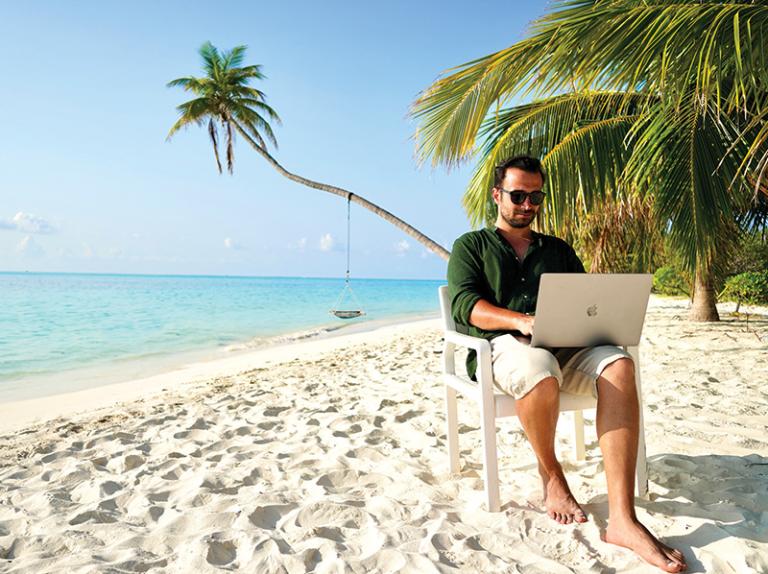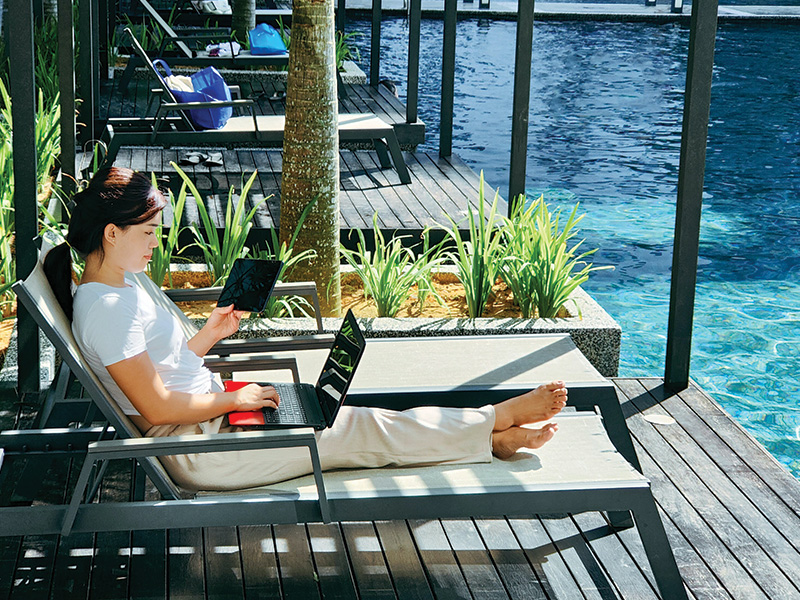
By: Gio Palatucci, Sparkloft Media
In our Spring Traveler Mindset Report, one of the shifts we examined was the Great Resignation and its impact on traveler motivations and behaviors. We discussed how the mental health burdens of the past two years caused employees to drastically re-evaluate what they want out of work. Top achievers were no longer willing to sacrifice their mental health for their careers and began prioritizing a more well-rounded lifestyle.
With “return to office” conversations looming, flexibility has become of utmost importance, with 50% of workers saying they would rather quit their job than return to the office full time.
What does this mean for travel?

Introducing the Bleisure Traveler Mindset
“Home” is the new destination. Enthusiasm for travel has risen simultaneously with the rise of remote work, completely disrupting the travel space and giving a new definition to “bleisure” travel.
Deloitte calls this new group “Laptop Luggers,” or travelers who take about two to four trips a year.
The benefits to destinations? These visitors are staying longer and spending more. The same Deloitte study found that 75% of laptop luggers add extra time to their vacation, with 38% adding from three to six days to their trip. With companies experimenting with 4-day work weeks, let’s look at three other indications that this trend might become a permanent reality.
Corporate TikTokers are Sharing the Perks of Remote Life
On TikTok, videos tagged #corporatetiktok have generated over 1 billion views as memes poking fun at virtual office tropes took off during the pandemic. Now, these corporate comedians are turning their punchlines toward remote work. Top creators like @rod, @corporatenatalie, and @loewhaley have all created content about blending work and travel for their mental health– no matter what their stickler manager has to say about it.
Check out this TikTok for an example.
Why does this matter? The perks of remote life reaching meme status indicates that these trends have reached a level of normalcy among everyday people
Airbnb Wants to Help You To Live and Work Anywhere
In the third quarter of 2021, Airbnb booking data revealed that almost half of the nights booked on its platform were for stays of at least seven days, up from 44% in 2019. The trend prompted CEO Brian Chesky to declare 2022 his year of remote living to better understand the future Airbnb consumer.

Since our Spring report was published, Airbnb has reported year-over-year growth in Q2 of 2022, citing a spike in gross nights booked, with 19% of those bookings for stays of 28 days or more. Airbnb isn’t just talking the talk; it’s walking the walk with its new corporate policy to allow employees to live and work from anywhere.
Destinations are Incentivizing Remote Work
Digital Nomad Visas were not a pandemic invention. Still, the interest in this special visa, which allows the holder to work remotely from a foreign country for an extended period, has grown exponentially since 2020. Once perceived as a program for bloggers with a backpack, these nomad visas are appealing to regular workers who now have the flexibility to work from anywhere. Plus, there are several destinations stateside that are seeing the economic value of attracting remote workers for the long haul: Tulsa’s “Tulsa Remote” program, Tucson’s “Remote Tuscon,” and Hawaii’s “Movers and Shakas.”

What Does This Mean for Destination Marketers?
Travelers looking to add a few extra vacation days to work from their travel destination will become more of the norm, flipping the script on “life-work” balance. This gives destinations the opportunity to target and attract visitors in new ways, such as building neighborhood guides that include grocery stores and pharmacies, building itineraries for “long-term” stays, and updating the accommodations section of your website to feature properties with extended stay amenities.
To learn more about the Bleisure Pursuit mindset and other emerging “post-pandemic” traveler behaviors, download our Traveler Mindset Report.


